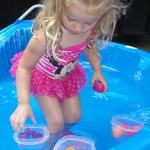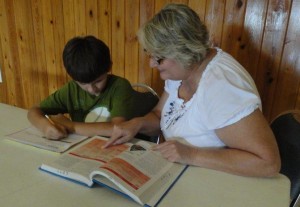by Melanie Taylor | Jun 2, 2014

Summer camp teaches children independence and leadership skills.
Summer is here and summer camp is on the horizon. Maybe this is your child’s first time to an overnight camp or they are “old pros” at this thing called camp. Many parents and children will have camp anxieties, but here are some things you can do to prepare your camper and yourself for camp.
Campers:
• Plan several sleepovers before the week of camp arrives. Resist the urge to pack their bags for them or to check on them while there. If they have a cell phone, have them leave it at home. This is a good way to practice not having direct or constant contact.
• Encourage them to write a letter to someone (maybe you) while at camp. You will be so excited when you receive a letter from camp! Be sure to include envelopes, addresses, stamps, paper, and a pen in their luggage.
• Gear up physically. If you have purchased your camper new tennis shoes, have them break them in with a few long walks so the blisters don’t happen at camp.
• Especially for teenagers, have them take a mini-vacation from their electronic devices – a couple of hours or a weekend.
• Have them write a statement for their social media pages. “Peace out Facebook, I will be at camp for the next week. Check in with you when I get back” or something similar.
• Have them write down their goals for camp so they can mentally prepare themselves for what they hope to do and see.
• Make a homesick plan:
1. Homesickness isn’t entirely bad. It’s great to love your home. It’s sometimes part of the process and it’s a confidence-booster when a camper gets through it.
2. Make a “happy place” plan and write it down. This is an amazing opportunity to learn a life skill. Today’s youth go to technology to escape and studies show this increases their stress. Some ideas include: taking 10 deep breaths, traveling to a “happy place” in your mind, packing a certain stuffed animal, or tossing a football. Children are capable of this independence.
3. Your plan should NOT be, “Give it a couple of days and if you don’t like it, we will come get you.” This will set them up to give it a couple of days and knock the confidence right out of them.
4. Let your camper know what to expect with correspondence. You don’t need to write every day but let them know what to expect.
Parents:
• You are giving your child an incredible gift. I cannot promise you they will not lose some socks, they will love every meal or activity, and they will adore every staff member. But you are preparing them for college and beyond; you are giving them the freedom to gain confidence, independence, and leadership skills; and you are instilling in them that they can do it.
• What do YOU want to do during their time at camp? Plan a vacation for a later time, organize the house, or enjoy one-on-one time with your other children or some “date nights” with your spouse or friends.
• If you have apprehensions, work to resolve them. If you are worried your camper is not going to know anyone, set up a pre-camp get-together. If you are worried about your camper’s medical needs, become friendly with the camp staff. If you are anxious about their food allergies, talk to the camp’s director. Make a camper-sick plan for yourself. Make sure there is only excitement and optimism coming from you; share your anxiety with another adult.
• Pack self-addressed stamped envelopes in their luggage.
• Whether they are flying or driving, hold off on crying your eyes out until they cannot see you. Take a deep breath, trust, and remind yourself you are giving them an awesome gift.
And just what is this gift everyone is talking about? At camp, they will be part of a community all their own. They will become emotionally attached to handmade rope bracelets on their wrist, and have a song for any occasion on cue, and maybe even forget they need to shower, and think sunscreen is just a normal daily moisturizing technique. They will learn to do things on their own and they’ll learn to rely on others. They will learn how to survive on their own for a week or two and they’ll learn how to help each other through it.
They may even grow up on summers away from TV and forget Facebook exists. They will relish the joy of sleeping in cabins, swatting mosquitoes at campfire, and swimming every day. They will savor the feeling of pushing water behind them with a paddle and the whoosh of air behind the tail of an arrow as they fire. They’ll forget about appearances, relish tan lines, and recognize the beauty of a smile over anything else.
So send your kids to camp. Send them so they’ll learn to set tables and make beds and wake early. Send them so they’ll know how to be a leader, paddle a kayak, weave a bracelet, and sing as loud as they can. Send your kids to camp so they’ll learn to love themselves and learn to love others. Send your kids to camp because they’ll realize who they are – or who they want to be. And, prepare yourselves for a year of camp stories and for a flurry of songs. Prepare to learn names of kids you’ve never met. And for your kids to have a need for sunshine, campfires, and companionship. They will be forever grateful for your awesome gift of summer camp.
Source:
American Camping Association, Inc. (http://www.acacamps.org)
by Monica Brinkley | Jun 2, 2014

Simple sorting games teach pre-math skills to young children.
Children are born curious and are constantly learning about the world around them. Children learn basic math skills through daily activities and interaction. They practice basic math skills as they notice differences between things, how events happen the same way every time, and how they can make events happen. Many parents push their children to count to ten, but teaching children to count involves more than reciting. It involves helping children understand the meaning of numbers.
Children will learn the meaning of numbers when they are developmentally ready. They might know the numbers in sequence, but are not able to use them to count. In others words, they may count to three and move four objects. Begin counting with children around the age of two to three. This helps children begin to move towards matching one thing at a time with the numbers as they say it.
Three- to four-year-old children are still learning to understand quantity. They usually can count to five and are growing in their understanding of what numbers really mean. By ages four to six, they are counting with meaning, usually matching the numbers one to ten with ten items.
Counting can be fun with your help. There are many fun activities you can do with your children to assist in learning the meaning of counting. Count socks as you sort them; count the juice boxes in the refrigerator or the cars going by. The more experience they are given, the more they will learn the meaning of numbers. Giving your child experience regularly will help them in their understanding of numbers.
To help your child get ready for math, give him/her opportunities to think about patterns and to sort things. Use items you find around the house or outside. Lay out a pattern with items such as a leaf, stick and stone and repeat the pattern. Ask your child to make the same pattern. This is a very simple but fun way to introduce math concepts. Sorting can be done easily when doing household chores. Sorting towels by color, putting small towels in this spot on the shelf and large towels in that spot are just a couple of sorting ideas.
Learning about shapes, space, and measurement are also pre-math skills you can help preschool children develop. Talk about shapes as you are walking or riding down the road. Examples: see the round stop light; this sandwich is square until we cut it in half, it then becomes a triangle. Inches, feet, and other units of measurement don’t make much sense to a young child. However, you can teach a child to measure with objects like a shoe. Have them see how long a rug is with a shoe. Then work up to giving them a ruler to work on measurement problems.
Teaching pre-math skills is easy. Recognize the curiosity in young children and use this as an opportunity to teach in a fun way.
Source: Penn State Extension; Better Kid Care, Math for Every Age.
by Monica Brinkley | Sep 24, 2013
Normal
0
false
false
false
EN-US
X-NONE
X-NONE
/* Style Definitions */
table.MsoNormalTable
{mso-style-name:”Table Normal”;
mso-tstyle-rowband-size:0;
mso-tstyle-colband-size:0;
mso-style-noshow:yes;
mso-style-priority:99;
mso-style-parent:””;
mso-padding-alt:0in 5.4pt 0in 5.4pt;
mso-para-margin:0in;
mso-para-margin-bottom:.0001pt;
mso-pagination:widow-orphan;
font-size:11.0pt;
font-family:”Calibri”,”sans-serif”;
mso-ascii-font-family:Calibri;
mso-ascii-theme-font:minor-latin;
mso-hansi-font-family:Calibri;
mso-hansi-theme-font:minor-latin;}
Some children dread the thought of doing homework. They may leave an assignment for the last minute or refuse to do it all together. Many parents handle this by trying to force their children to do their homework. However, getting into a power struggle with your child is not effective. By having clear rules and expectations, you can create a positive situation for both you and your child.

Help children develop good study habits
Meaningful homework can help students do better in school, especially as they get into the upper grades. Homework teaches children responsibility, as well as how to follow directions, manage time, begin and complete a task, work on their own, and practice what they’re learning in class. However, most children would much rather be playing or doing other things than homework. Many parents and children struggle over when, where, and how homework will be done.
At times, parents may feel that it would be easier just to do the work for their children. However, the National Parent and Teacher Association advises parents to let children do homework themselves. You may need to sit with elementary-school-age children and walk them through the process of how to study, help them organize the materials they need, and make sure they’ve completed all their tasks. As you do this, you are laying the foundation for good study habits.
Parents can offer to help check homework, but helping is very different from taking over. You also can reinforce good habits by helping your child find a regular place to work and a regular time of day to do homework. Instead of asking if your child has homework every night, always assume that there is homework, reading, or studying of some kind to be done.
Here are some tips on things you can do to help your children with homework:
- Have a set time for your child to do homework.
- Get the whole family involved by setting a regular family quiet time for working. Provide your child with a comfortable and well-lit place where they can do homework, such as a desk or a kitchen table with a chair. Minimize distractions by turning off the TV and making video games off-limits during quiet time.
- Make sure your child has pens, pencils, notebook paper, and any other supplies. Know where to direct your child to get information they may need, such as a school, a website, other children in the class, or a teacher’s help before or after school.
- Think of yourself as a coach to your children, providing assistance on what to do next if they get stuck, checking over their work when they are finished, or even helping them practice testing themselves on new skills. Showing interest in their work and encouraging their efforts can be a boost for your children and help them find greater success in school.
- Avoid constantly nagging or lecturing your child to do homework. If your child is continuously frustrated by or unable to complete assignments, visit your child’s teacher. Discuss ideas to work out possible strategies to help your child succeed.
For further information, go to EDIS.IFAS.UFL.EDU.
Sources: FAR1718 Helping Children with Homework, Heidi Liss Radunovich; FCS2203 Parenting During the Elementary School Years, Part 2: Discipline, Millie Ferrer-Chancy, Ingrid Rivera and Anne M. Fugate.



